Allahabad HC Sets Aside Afzal Ansari's Conviction, Allows Him to Continue as MP

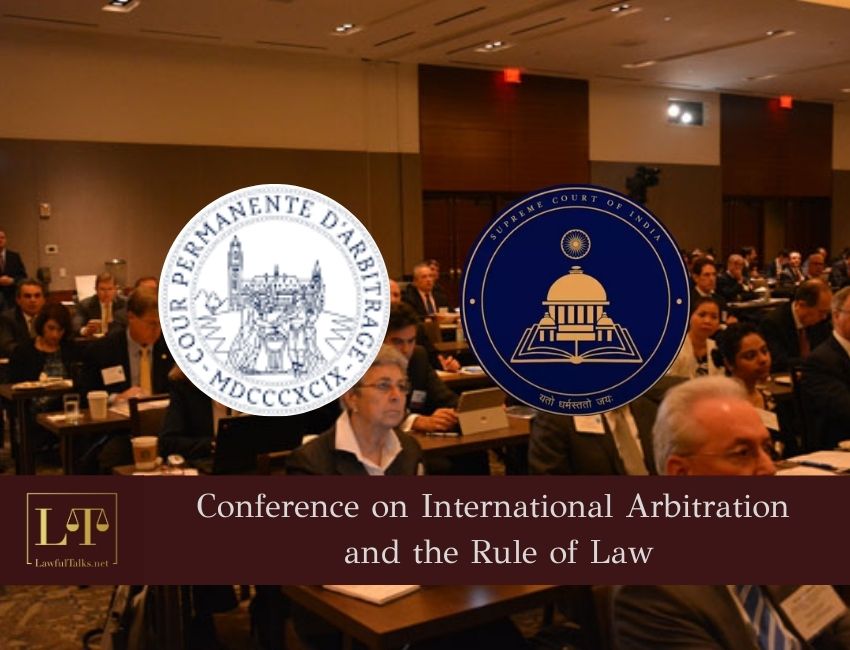
The valedictory session of the recent conference on "International Arbitration and the Rule of Law," co-hosted by the Supreme Court of India and the Permanent Court of Arbitration in collaboration with UNCITRAL, shows India's growing engagement with international arbitration. The event gathered prominent legal figures and judges from India, including Justice Surya Kant, SGI Mr. Tushar Mehta, Mr. Dammu Ravi, and International Arbitration luminaries.
Over the course of two days, this distinguished gathering facilitated rich dialogue on pressing issues within the domain of international arbitration. The diverse perspectives shared by these experts not only underscored India's pivotal role in the international arbitration landscape but also highlighted the need for strengthening the rule of law in global dispute resolution.
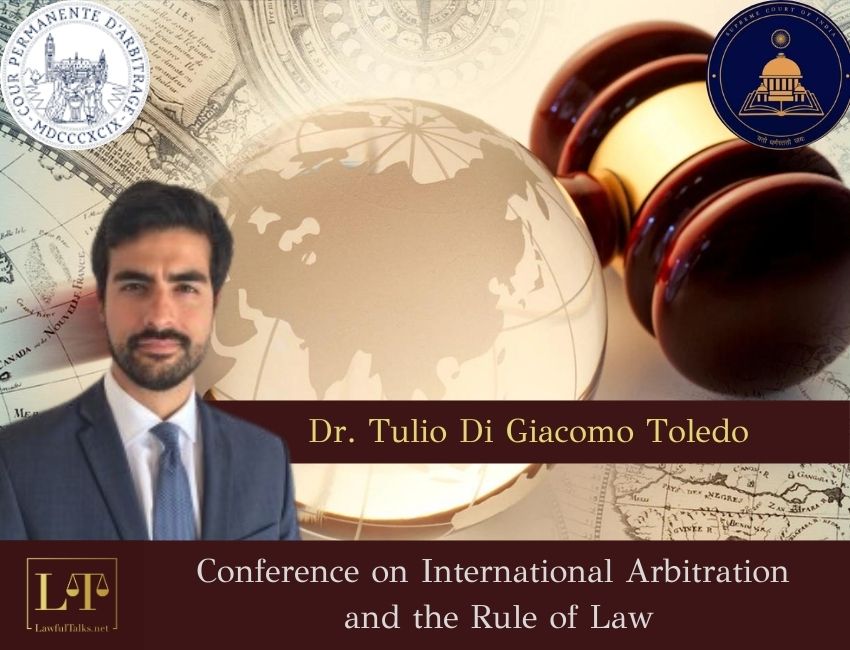
A significant focus from Dr. Tulio Di Giacomo Toledo's address was the re-emergence of interstate arbitration. He noted, "Interstate arbitration, which was widely used to settle disputes between states in the late 19th century, is now re-emerging as a prominent method of dispute resolution." This resurgence shows the growing trust in mechanisms like the Permanent Court of Arbitration (PCA), which, according to Mr. Toledo, "has experienced a resurgence, regaining the trust of the international bar and becoming very active once again in the field of interstate dispute settlement."
Investor-state arbitration was another focal point, with Dr. Toledo highlighting, "In the context of investor-state arbitration, the word 'reform' was frequently heard." He also acknowledged Mr. Nicholas Peacock's insights into mediation: "Mediation in investor-state disputes provides a useful roadmap," with potential for settlement discussions to continue even as arbitration proceeds. Additionally, Mr. V.K. Rajah’s concerns about the "unequal playing field in international arbitration" were highlighted.
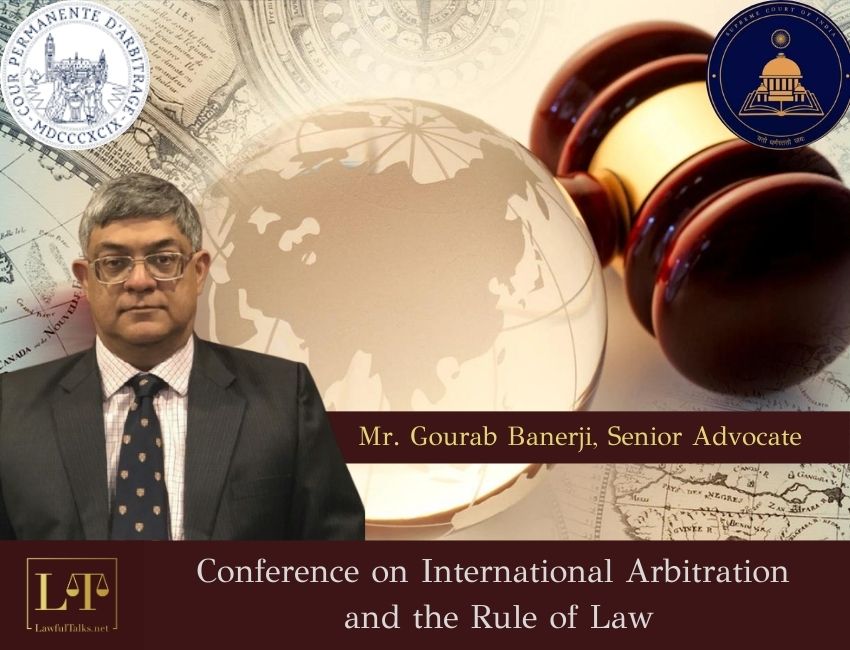
A significant part of Mr. Gourab Banerji’s speech focused on the contribution of the late Fali Nariman, an extraordinary figure in international arbitration. Mr. Banerji acknowledged Nariman’s crucial role in bridging the gap between the Permanent Court of Arbitration (PCA) and the Supreme Court of India, stating, "Even this conference, which we are attending today, was Fali Nariman’s brainchild."
Mr. Banerji also reflected on Nariman’s thoughts regarding Investor-State Dispute settlement (ISDS). He emphasized Nariman’s insight that domain experts and practitioners often overlook the most crucial player—the party to the dispute. Mr. Banerji reiterated this point: "We, as so-called domain experts or arbitration practitioners, continue speaking to each other without considering the most important player in the dispute—the party."
Mr. Banerji also touched on a critical theme of the conference—tension between arbitration and the rule of law. He expressed that arbitration and the rule of law are sometimes in conflict, even going so far as to suggest they may be "antithetical" in practice. Quoting Fali Nariman, Mr. Banerji emphasised the need for arbitration to be a process that produces just outcomes consistent with the rule of law, while acknowledging that the current state of both domestic and international arbitration does not always inspire confidence among its users.
Mr. Banerji further elaborated on the crisis of confidence in arbitration, especially in domestic cases, where concerns persist regarding the fairness of the system. He cited Nariman’s view that arbitration, as a process, is "not a panacea for all ills," reminding us that arbitration should not be an end in itself but a means to achieve just and fair results.
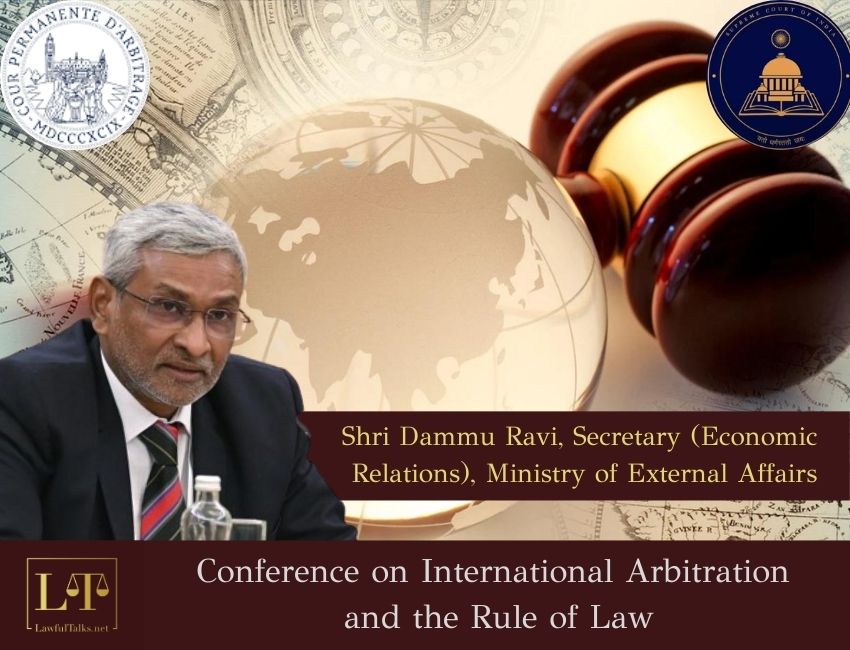
Mr. Dammu Ravi's speech revolved around the connection between India’s economic rise and the necessity for robust dispute resolution mechanisms to attract foreign direct investments (FDI), stating, "Disputes are natural in a growing economy, and this means that mediation, reconciliation, and arbitration become integral."
Mr. Ravi also touched on the importance of having a well-structured arbitration system to attract greenfield investments, saying, "Without a robust arbitration system, real investments will not flow in, leading to more brownfield investments rather than greenfield investments." His comments reflect the vital need for reliable arbitration practices to foster new developments rather than relying on existing assets, which could otherwise risk depleting national resources.
A key point of Mr. Ravi's address was the deepening collaboration between India and the Permanent Court of Arbitration (PCA). He mentioned the "soft launch" of the PCA office in India while noting,
"The PCA could not have asked for a better location—close to the Supreme Court, Chambers of Commerce and Industry, and more importantly, government offices and legal luminaries concentrated in this part of India, Delhi."
In Mr. Ravi's view, India's contribution to global arbitration, especially for developing countries, is poised to grow. "The global South will benefit greatly from the PCA we are setting up, as many countries in this region lack the institutions needed to handle arbitration cases," he said, indicating India's intention to assist neighbouring and developing nations in building their arbitration capacities.
Mr. Ravi also addressed concerns surrounding the Investor-State Dispute Settlement (ISDS) mechanism, which often prioritises profit over the developmental needs of host countries. He called for a shift in focus towards "responsible investments that are development-oriented," arguing that investments should contribute to sustainable growth in developing nations rather than exploit legal loopholes for profit.
Furthermore, Mr. Ravi pointed out the dysfunctionality of the WTO’s dispute settlement mechanism and the increased relevance of international arbitration as a remedy for trade and investment disputes. His remarks showcased India's broader role in global economic governance and dispute resolution during a period of uncertainty for multilateral institutions like the WTO.
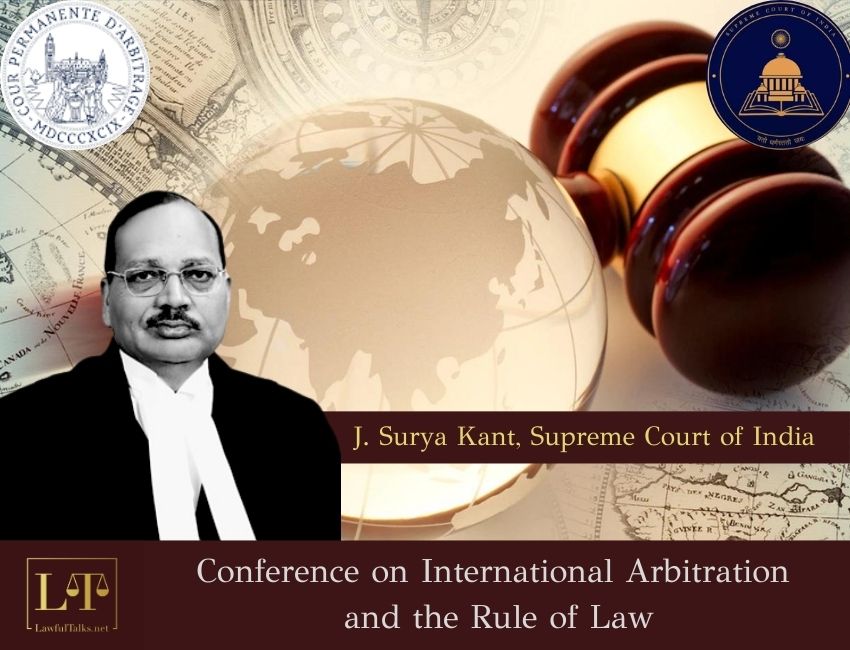
Justice Surya Kant emphasised the significance of the Permanent Court of Arbitration (PCA) and India’s growing involvement in the international arbitration framework. He remarked,
“The PCA holds the distinction of being the first permanent intergovernmental organization to provide a forum for the resolution of international disputes through arbitration and other peaceful means... it has helped nations, businesses, and individuals resolve their differences in a way that fosters trust, dialogue, and fairness.”
This sentiment fits with India’s desire to establish itself as a hub for arbitration, particularly with the opening of the PCA office in New Delhi.
Justice Kant’s remarks highlight the practical impact of arbitration’s rise globally, noting that the “PCA administered 246 cases in 2023,” a significant increase from 2022. These statistics underscore the growing importance of arbitration as a trusted mechanism for dispute resolution, particularly in the context of investor-state arbitration. He further acknowledged the role of Indian jurists, noting with pride that “the four Indian appointments to the roster of the PCA are all retired Supreme Court or High Court Justices.”
Justice Kant pointed out that the PCA’s presence in India will not only attract international parties but will also benefit Indian businesses by making arbitration more “accessible to our own businesses and individuals.” This local presence is poised to reduce the costs and logistical barriers traditionally associated with international arbitration.
Moreover, Justice Kant reflected on India's historical connection to arbitration, noting that “arbitration itself is by no means a novelty for the Indian subcontinent,” drawing attention to the long-standing tradition of arbitration in India's legal and cultural history. This aligns with the government's current efforts to modernise and streamline arbitration practices in the country.
The establishment of the PCA office in India symbolises a “paradigm shift” in the nation’s journey towards becoming a global hub for dispute resolution. Justice Kant concluded by urging “continued cooperation between international and domestic arbitration bodies,” reinforcing the need for collaboration to uphold the integrity of arbitration and ensure that it remains a fair, cost-effective, and accessible process globally.
The Conference on International Arbitration and the Rule of Law has showcased India’s growing role in global arbitration. The new PCA office in Delhi and the discussions at the event mark significant steps towards enhancing international dispute resolution.
(For more updates, tap to join our Whatsapp Channel and our LinkedIn Page)

Sonam Pandey
Law Student
Latest Posts
Categories
- International News 19 Posts
- Supreme Court 390 Posts
- High Courts 383 Posts



















































































































































































































































































































































































































































































































































































































































































































































































































